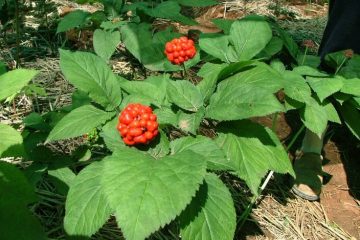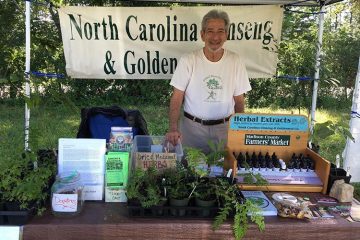Ginseng Cultivated at Madison Farm
by Diana Schmitt –
Madison County Sentinel, September 8, 1999, page 18.
Eagle Feather Farm, at first glance, doesn’t not look like a typical farm — there are no tractors, open fields, or barns. What you will find instead is shady southern Appalachian forest.
Robert Eidus, owner and operator of the farm, raises ginseng, goldenseal and other native medicinal herbs as well as Chinese herbs.
The 30-acre-tract upon which Eidus’ farm rests lies off Indigo Bunting Rd. near Barnard. Eidus mentions that this is a “famous piece of land”, as it once belonged to Howard Allen, known for having “pulled everybody out to the ditches of Madison County.”
Also famous to the land is the 27-foot deep fishing hole on the French Broad River.
Eidus purchased the land in 1980 and made the final move to the area in 1993 when he founded the North Carolina Ginseng and Goldenseal Company.
Eidus, a former “urbanite from the Northeast,” found himself drawn to the cultivation of ginseng and goldenseal by at least two events. In 1992 he attended an historical conference by Dr. Jeanine Davis on ginseng.
He soon after discovered ginseng on his property and learned that goldenseal is endangered in North Carolina. Since then he has felt called to make the herbs available to others
According to Eidus, North America and China are the only places on the globe where ginseng exists natively. North Carolina produces 9,000 pounds of ginseng per year. 94% of this goes to Hong Kong for processing. It takes approximately 400 roots to make one pound.
Madison County currently ranks second in North Carolina, behind Jackson, for ginseng exportation at an average of 800 pounds per year. This is likely due to the fact that 78% of Madison is forest- -the habitat that ginseng naturally thrives in.
The majority of Madison’s ginseng is ‘wild crafted’ This means harvesters are not involved in the cultivation of the plant. They merely walk the mountain habitat and collect the roots as they find them.
What Eidus is doing is very unusual. He is cultivating his plants in the wild and not exporting them. He stated that he is the “only person who deals with it from seeds and roots to the final products.” He believes American ginseng should go to Americans. As well, because he is cultivating the plants in their native habitat, they are organic.
This in contrast to standard commercial cultivation in areas such as Wisconsin where plants are cultivated in raised beds and sprayed heavily everyday with chemicals to prevent fungus. Plants are then exported to Hong Kong for processing.
Two factors increase the cost of ginseng by twofold – – commercial cultivation and exportation of the roots. Whether wild crafter or cultivated, to Hong Kong for processing. The price of one pound increased from $300 to $ 600.
“The best roots are wild ones,” stated Eidus. It is healthier and cheaper to use local, wild organic roots.
Eidus believes that ginseng is “the most remarkable plant on the planet because it affects the most parts of the body of any plant.” Ginseng is ideally a tonic for the preservation of the whole body. It should be considered a holistic aid to better health, rather than medication for a particular symptom.
Traditionally, Eidus relates that ginseng has been touted to: increase fertility, increase red blood cell count, increase brain activity, aid in sleep disorders, regulated blood sugar in diabetics, increase energy, lower stress levels, and generally produces a longer life.
Eidus’ vision for Eagle Feather Farm is “to get excellent quality products to the public.” He wants his farm to become an educational center, to demonstrate sustainable farming of the forest, proper composting, and efficient solar energy and water usage.
As part of this educational intent, Eagle feather Farm will be one of six farms on the 1999 Mountain Farm Tour. The tour is highlighting small farms in Madison and Buncombe counties using a variety of approaches to sustainable practices.
In addition, Eagle Feather Farm is a member of the North Carolina Herb Association and the Mars Hill farmers’ market.
Eagle Feather Farm has a license from the state of NC to purchase ginseng for export. There are approximately 9,000 lbs of NC ginseng sold to Hong Kong each year. In Madison County, NC, where Eagle Feather Farm is located, there were approximately 800 lbs collected. Each harvester has to complete a NC state form, indicating the county where the ginseng was harvested, the date, plus the pounds. Wild ginseng looks, tastes, and smells different from cultivated and sprayed ginseng.
When the 1-26 corridor was opened, Eidus made 29 native plant rescues. He was able to save numerous species which otherwise would have been bulldozed. Eidus offers tours of the farm and holds yearly spring conference, “Food is Medicine, Medicine is Food.”
Eagle Feather Farm is young and growing. Presently the farm offers tonic and corrective tinctures, on, two and three-year-old ginseng roots for planting, goldenseal roots, and seeds from five states.
“I am on of the only people selling organic ginseng in eastern America,” comments Eidus. Unfortunately, he can’t produce it all yet and must accept some roots and seeds from other farms which are not organic.
“Nobody is selling organic,” stated Eidus. He looks forward to a time when his farm is able to produce his entire inventory organically. And he hopes that as organic becomes important to more and more people, there will be some competition.





